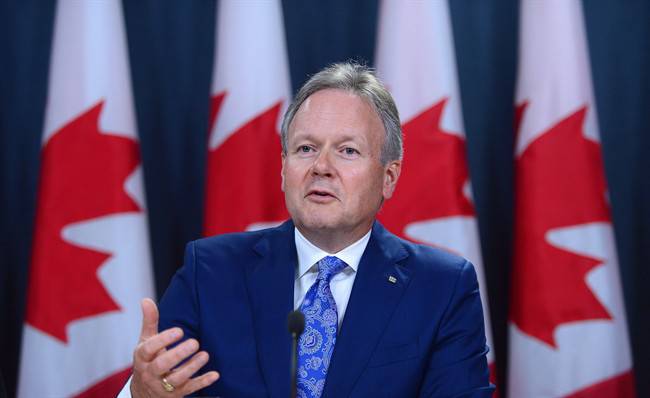
OTTAWA — Bank of Canada governor Stephen Poloz says it’s time for fresh ideas when it comes to Canadians’ mortgage options.
Poloz used a speech Monday to call for more choice in the country’s mortgage marketplace. He made arguments in favour of several possibilities such as encouraging borrowers to choose renewal terms longer than five years, the creation of a market for private, mortgage-based securities and the launch of shared-equity mortgages for first-time home buyers.
More innovation would help boost flexibility for borrowers, lenders and investors, while also lowering risks in the financial system, Poloz said in Winnipeg.
“To be clear, the system is not broken — it has served Canadians and financial institutions well,” he said in his speech to the Canadian Credit Union Association and Winnipeg Chamber of Commerce.
“But we should not stop looking for improvements and I invite all of you to join this effort.”
Poloz made the recommendations at a time when the central bank is monitoring three key housing-market stories. He listed them as the oil-slump-driven slowdown in Alberta and Saskatchewan, steady growth in many other parts of Canada and the steep drop in resale activity in Toronto and Vancouver following the introduction of stricter mortgage guidelines.
Looking ahead, he predicted the overall Canadian housing sector to start growing again later this year as the Vancouver and Toronto markets stabilize.
In a news conference following the speech, Poloz offered more details about his take on the two big housing markets.
Poloz said the fundamentals — like population growth and job creation — in those cities have been “really strong” and he expects they’ve “put a floor” under the adjustment process. The still-low interest rates remain quite attractive, he added.
He credited the tougher mortgage guidelines, which brought in interest-rate stress tests, for working as they were designed. They helped improve the quality of loans and stop the speculative increase in house prices in Vancouver and Toronto, he said.
Poloz predicts buyers affected by the stress tests will return to the market in search of less expensive homes, while some will wait until they’ve saved more for a down payment.
“All those conditions give you confidence that it’s a matter of adjustment and, after that, a return to normal growth,” he said.
On his request Monday for more brainstorming on the mortgage marketplace, Poloz said he’s wondered why so few changes have been introduced in his lifetime.
“I think that’s unfortunate and that’s why I gave a speech on it — it’s kind of a call to arms,” Poloz told reporters.
“I think there ought to be more innovation.”
His speech laid out several possibilities.
In its spring budget, the federal government announced it would create shared-equity mortgages as a way to provide interest-free loans to help first-time home buyers add to their down payments. The plan, if implemented, would also encourage a lift in housing supply, Poloz said.
The government is expected to provide more details on the proposal later this year.
Poloz said the plan would help make the financial system safer because mortgage risks would be shared between the borrower and the lender.
In another example, he suggested there should be more work to promote the merits of fixed-rate loans longer than five years because many people are unaware that longer-term options already exist. Only two per cent of all fixed-rate mortgages issued in 2018 had durations longer than five years, he added.
For borrowers, longer terms would mean they would have to deal with fewer renewals, reducing the risk that they will face higher interest rates. Policy-makers would also benefit from the increased stability related to fewer renewals.
He said there’s some momentum in Canada towards the creation of a private market for mortgage-backed securities. Poloz said it would provide a more-flexible source of longer-term funding for uninsured mortgages, which are becoming more popular.
They would have to be designed carefully, he said, because mortgage-backed securities were central to the “sub-prime debacle” ahead of the financial crisis more than a decade ago.